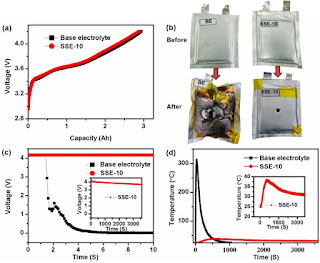In a paper in the Journal of Power Sources, they report that the cycling stability and rate capacity of LiNi0.5Mn1.5O4/Li batteries are improved by using the hybrid electrolytes. Nail-penetration tests showed that LiNi0.6Mn0.2Co0.2O2/graphite battery with the hybrid electrolyte demonstrated obviously enhanced safety compared to cells using traditional liquid electrolyte.
Currently, liquid electrolyte still [dominates] the commercial LIB market since they are low cost, easy to prepare and [feature] high ionic conductivity. However, the highly flammable character of the electrolyte solutions usually helps to aggravate battery thermal runaway and leads to dangerous conditions, such as fire and even explosion. Now, researchers have tried to use electrolyte additives (flame retardants) to suppress electrolyte flammability. … Unfortunately, some of the flame retardants have negative effects on battery performances due to their reactivity with the electrode materials in Li-ion cells.
Ionic liquids exhibit low vapor pressure and [have] good thermal, chemical and electrochemical stability, which have a promising application in high-voltage LIBs. Ionic liquid based electrolytes tend to be non-flammable when used as electrolytes in LIBs, and thus [are] favorable to enhance battery safety. … However, despite the above mentioned advantages, ionic liquid based electrolytes usually suffer from relatively lower ion conductivity, poor electrode/electrolyte compatibility and high cost of manufacturing.
Solid-state electrolyte is a potential candidate for high safety high energy storage systems, because it could overcome most of the safety issue encountered by using liquid electrolyte, such as leakage, volatilization and so on. However, despite considerable interest in solid-state batteries, many challenges still remain in both manufacturing and fundamental understanding of this technology.
… Developing hybrid electrolyte is now considered to be a new strategy to overcome the above challenges.
—Xu et al.
Read more at Novel Hybrid Electrolytes to Enable High-Safety High-Voltage Li-ion Batteries

Products listed on our website are either in stock or can be resynthesized within a reasonable time frame.1-hexyl-2,3-dimethylimidazolium hexafluoroantimonate
ReplyDelete